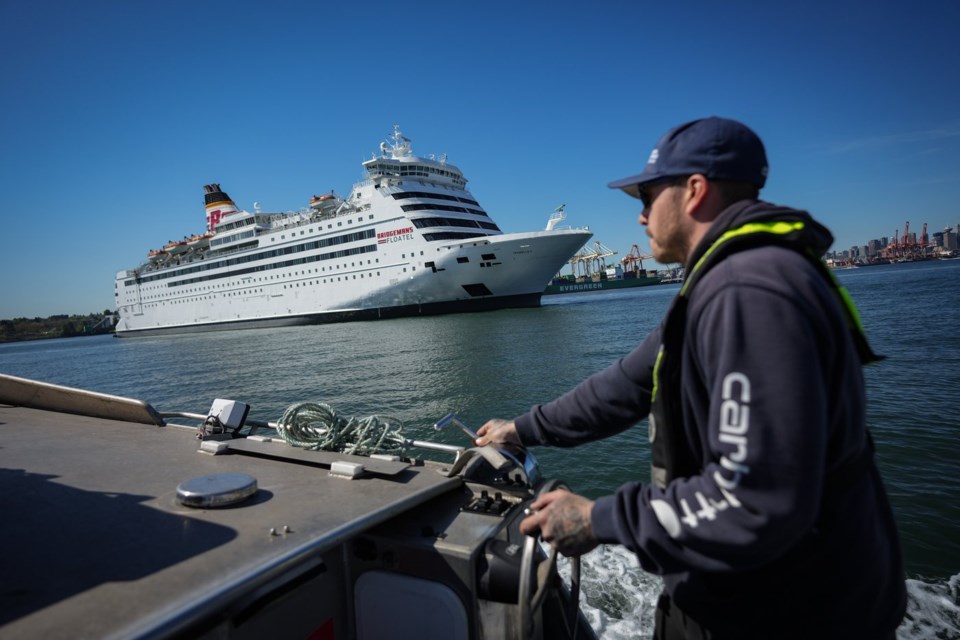SQUAMISH, B.C. — The company behind a natural gas project near Squamish, B.C., has withdrawn its application for a local permit to house workers in a converted cruise ship, and is instead pressing ahead on the basis of a provincial order.
The District of Squamish had yet to issue a temporary use permit authorizing the so-called floatel, which has been the subject of debate in council meetings in recent months.
But Woodfibre LNG's president Christine Kennedy says the terms of the proposed district permit are "no longer applicable" after a British Columbia government agency ordered the firm to house workers on the vessel in Howe Sound by Friday.
Kate Mulligan, the director of major projects, industrial, for the District of Squamish, told a council meeting on Tuesday that Woodfibre withdrew its application following the compliance order from the B.C. Environmental Assessment Office.
Mulligan said district staff had planned to present further information that councillors requested from Woodfibre, but the company withdrew its application, saying the order negated the need for a district permit.
An inspection record from the B.C. assessment office says the liquefied natural gas project carries a requirement that any workers who didn't live in Squamish before Sept. 20, 2023, must live on the floatel unless they've been granted an exemption.
The inspection found about 300 workers were living at a construction camp in Port Mellon, north of Gibsons, B.C., 30 were in hotels in Squamish, and a further 87 workers weren't living in either of those locations, the document says.
Those community accommodations aren't in compliance with Woodfibre's environmental assessment certificate for the project, it says.
The office had asked the company for more information about its workforce accommodations after becoming aware on June 7 that Woodfibre may be housing workers in a manner contrary to the requirements of its assessment certificate.
Mulligan told councillors on Tuesday that Woodfibre has been ordered to house workers on the floatel in its designated area by 5 p.m. on Friday.
Squamish councillors had voted three to four against a one-year permit at a meeting in May, where those opposed to the floatel plan raised concerns about the safety of women and girls, waste management and potential natural hazards.
They later voted to refer the issue back to staff and direct them to work with Woodfibre on increasing the security deposit for the floatel to $10 million.
Mayor Armand Hurford told Tuesday's council meeting that Woodfibre had interpreted the order "to supersede the jurisdiction of the District of Squamish," but he disagreed.
"As to next steps, they remain to be seen, but at this point in time, our position is that this order does not explicitly override the District of Squamish's authority.
"The province does have authority to do that, and there are specific mechanisms available for them to achieve that. This is not one of them."
Councillor Jenna Stoner said she felt the district had established "a really clear process to move this forward with (Woodfibre), with our community and with staff."
"It is disappointing where we are at," she said, adding she agreed with the mayor's position that B.C. has other mechanisms it could use to supersede the district.
Woodfibre president Kennedy said in a statement that the firm withdrew its application "in recognition that the district’s issuance timeframes and process for the (local permit) were inconsistent with the order" from the assessment office.
"Compliance with regulatory conditions is a core priority for the company and preparations are underway to move the floatel to site to accommodate workforce as mandated by the order," she said in a statement.
She said the firm will "continue to work closely with the District of Squamish" and had answered information requests from the district when the provincial order was issued.
"If the district wishes to issue a (permit) in the circumstances where an Order already applies, Woodfibre LNG will work with District staff on next steps."
The floatel arrived in B.C. waters in January after a 40-day journey from Estonia, where it had been converted to shelter Ukrainian refugees.
Before the compliance order, the ship had been moored off the coast of Nanaimo.
— By Brenna Owen in 91įŁ┤┤
This report by The 91įŁ┤┤ Press was first published June 19, 2024.
The 91įŁ┤┤ Press



